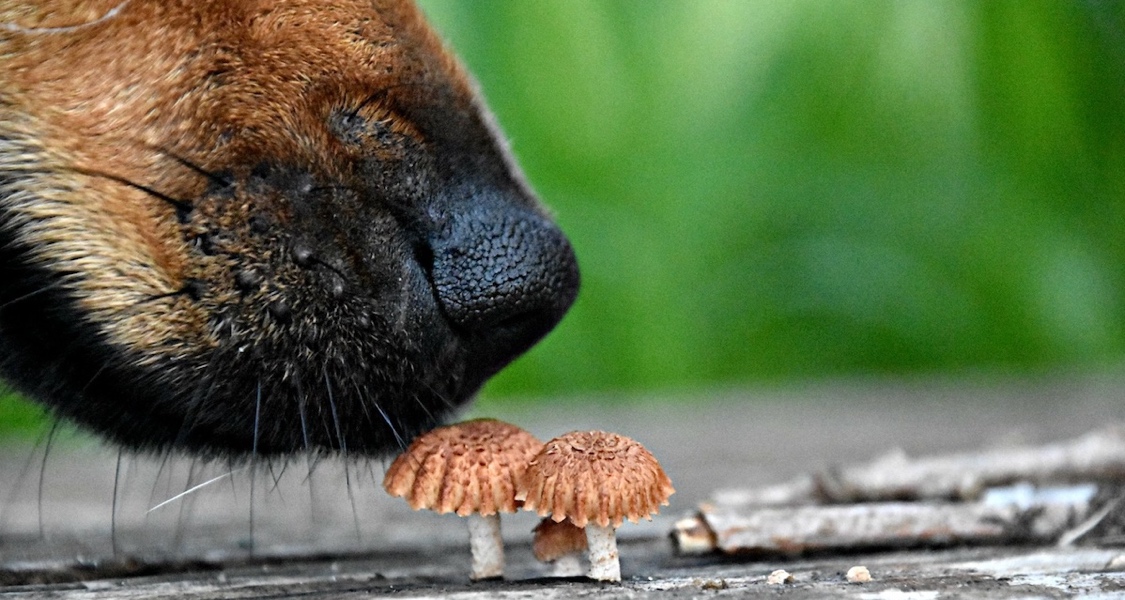The Facts Around Dogs Eating Mushrooms
By: Lisa Smith | Aug 9, 2021

Mushrooms are packed with vitamins, minerals and antioxidants, and studies have shown that they are highly beneficial for us humans, but are they safe for a dog to eat?
Mushrooms are an edible fungus, and while they have significant nutritional benefits, they do not contain phytonutrients and therefore they technically cannot be called a superfood.
Can dogs eat mushrooms?
Some mushrooms can safely be eaten by dogs and provide a variety of health benefits. Not all mushrooms are safe to eat, and that same principle applies for dogs as well.
Dogs tend to try to eat anything that smells or otherwise appears edible, especially when they are outside, so it’s important to know which mushrooms are safe to eat and which ones can pose serious health risks for your pup.
The health benefits of eating safe mushrooms.
Rich in B vitamins, antioxidants, potassium, niacin, riboflavin and pantothenic acid, mushrooms can help dogs maintain a healthy heart and red blood cells, support their digestion and even promote healthy skin.
They are also low in fat and calories, and contain no cholesterol or starches, making them a great choice for diabetic or overweight dogs. Mushrooms also aid digestion and add to feelings of fullness thanks to their moderate amount of protein and fiber.
Which mushrooms can a dog eat?
Out of a staggering 50,000 different types of mushrooms, Pet Food Sherpa explains that only approximately 2% of them are poisonous. That being said, ingesting a poisonous mushroom can result in anything from a stomach upset, liver failure or even death, so it is vital to know which ones are safe to eat.
Firstly, the safest rule of thumb is to only offer organic, grocery store-bought mushrooms to your beloved pooch. Mushrooms absorb environmental toxins, so commercially-grown, non-organic mushrooms could contain toxins harmful to your dog’s gastrointestinal system.
Secondly, it is simply never worth the risk of allowing your dog to eat wild mushrooms of any kind.
Safe mushrooms for dogs:
- Cremini – the adolescent version of the portobello mushroom, cremini mushrooms are often sold as baby portobello or baby bella
- Portobello – the mature version of the cremini mushroom, portobello mushrooms are the most flavourful of the Agaricus Bisporus mushroom species
- White Button – button mushrooms account for 90% of mushroom consumption in the US and are the baby version of the portobello mushroom
- Porcini – with a very short growth period, the porcini mushroom is highly prized in French and European cuisines and can be expensive
- Oyster – these mushrooms are not toxic for your dog but can look similar to mushrooms that are, so only feed them oyster mushrooms when they are store-bought
- Shiitake – also known as the flower mushroom or winter mushroom
- Reishi – this mushroom is primarily used medicinally as it is good for the immune system while also reducing allergy symptoms and inflammation
- Maitake – a mushroom with a mild flavor, it is also called the ‘hen of the woods’ and is used for medicinal purposes, too
All of the above mushrooms are used in supplements made for both humans and dogs, providing numerous health benefits. They can be eaten fresh or dried and pose no risks to a dog’s health.
That said, it is rare yet possible for a dog to have an allergic reaction to mushrooms that are safe to eat. Signs include immediate vomiting, loose stools or excessive gas, hives or a rash, an increased heart rate, and panting or other difficulty breathing.
If you suspect an allergic reaction, call an animal poison control helpline or your local vet and go to the nearest vet emergency clinic.
What to do if your dog eats a wild mushroom.
If you suspect that your dog has eaten a wild mushroom, be it from your yard or while out walking, you must assume that they are poisonous. Eating wild mushrooms can be life-threatening and action must be taken quickly.
As mentioned, contact an animal poison control helpline or your local veterinarian immediately and depending on your dog’s condition and the instruction you receive, take your dog to the nearest vet emergency clinic. The sooner you can get them medical care, the better the outcome.
If you are able to or have the time, take a sample of the mushroom you suspect your dog has eaten along with you for identification. You can also consult with the State by State Mushroom Identification information available online.
The most common signs and symptoms of mushroom poisoning are:
- Watery or teary eyes
- Excessive salivation or drooling
- Frequent urination
- Lethargy or weakness
- Staggering or imbalance
- Severe gastrointestinal upset
- Seizures
- Tremors
- Liver failure
The vet will likely induce vomiting and give your dog IV fluids to prevent dehydration, as well as anti-nausea medications and liver protectants to aid recovery.
Your dog’s prognosis will depend upon how early they receive care, their general health and their natural reaction to toxins. This is why it is essential to act fast if you suspect that they have ingested a wild mushroom.
Final thoughts.
Store-bought mushrooms that have been organically grown are safe for your dog to eat, as well as being a healthy choice for them. Introduce them slowly to ensure that they do not experience any allergic reactions and to avoid stomach upset from adding a new food to their diet.
The percentage of mushrooms being poisonous may be low, but if you suspect that your dog has ingested a wild mushroom, don’t take any chances. Mushrooms that are poisonous can be fatal and it just isn’t worth the risk.


Disclaimer: healthcareforpets.com and its team of veterinarians and clinicians do not endorse any products, services, or recommended advice. All advice presented by our veterinarians, clinicians, tools, resources, etc is not meant to replace a regular physical exam and consultation with your primary veterinarian or other clinicians. We always encourage you to seek medical advice from your regular veterinarian.

